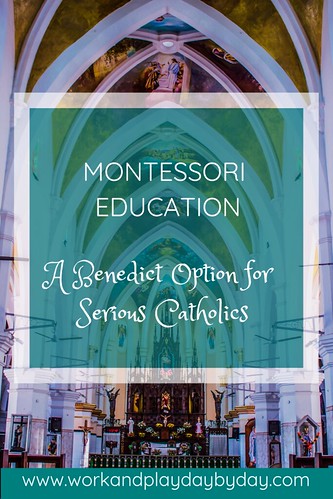
I'm probably the last traditionally minded Christian on the planet to read The Benedict Option by Ron Dreher, but that isn't going to stop me from taking what I know and writing an extraordinarily late to the party response/extension to what Mr. Dreher has to say about education.
One of the reasons I held off on reading this book is that I made the (incorrect) assumption that it was going to be about withdrawing and about duplicating monastery life in the home. I just could not quite shake the idea that option isn't best for my family. Nor, in the spirit of full disclosure, does Mr. Dreher claim it should be.
My mistake. I probably should have paid a little more attention to what others were saying, like this review from Bishop Robert Barron.
I don't want to talk about the whole book, I'll let you read it for yourself and discern your own conclusions. I'm really not an expert in much of what he says and we will be taking it to careful consideration ourselves. I would, however, like to expand on what he says about education specifically, because as he states, "Christians have not been alert to the importance of education, and its time to change that."
Truth: The public education sector is no longer safe, or even friendly, to orthodox Christians.
The Sexualization of School
The sexual agenda has invaded and its here to stay. It is far more complicated than opting out of certain content...the sexual agenda IS the content. Major money is being thrown at textbooks, etc, that have blatant themes promoting non-binary gender ideology. A massive amount of education equity and access research is focusing on gender minorities instead of racial, ethnic, and economic minority...despite a lack of published evidence of an academic achievement gap on standardized testing based on sexual identity and loads of statistics about the continued gaps involving racial, ethnic, and economic minorities. **PLEASE! See Note Below**
Opting out is not the option it was even 3-5 years ago. It's accelerating that quickly.
If you aren't in, you are wrong and you are bigoted, hateful, and more. So much so that it is with a careful hand I will push publish and share this post. Simply writing it is cutting my credibility with my peers in education and no doubt will ruffle the feathers of more than a few who think the problem can't possibly be as widespread as claimed.
Mr. Dreher presents a future where orthodox Christians are unable to teach except in orthodox Christian organizations. I'm going to tell you from where I'm sitting that is more here than not. For now, the tenure system protects a great deal of our orthodox faculty even at public institutions, but I anticipate that will not last forever. Yes, there are still public schools that have not yet been affected, but this will not last forever. Almost certainly in our lifetime, both situations will cease to exist.
I'm telling you that as someone who is deeply familiar with the inner workings of the other side of education.
Florists, bakers, and photographers were first.
Educators are next.
I knew it long before I read the Benedict Option.
But what do we do about it?
We don't opt out by skipping the sexual education unit, we opt out by skipping the schools altogether.
In a nutshell, Mr. Dreher promotes pursuing classical education.
According to Classical Academic Press, classical education,
If that doesn't work, homeschool.
**There is an undeniably large and disproportionate suicide rate among teens struggling with sexual identity. This is a real problem that should concern all Christians. That said, there has also not been a decrease in the suicide rates despite increasing access to hormone therapies and almost unlimited social acceptance of nongender-conforming students. This is a complicated issue, requiring undoubtedly complicated solutions from a social standpoint. My point is not that these students aren't struggling, but from a statistical standpoint, they aren't struggling academically. The focus has shifted to their wellbeing over the wellbeing of other students who statistically are struggling academically.
What does this have to do with Montessori?
If Classical education is a long-ago method of education that is going through a much-needed renewal, Montessori is a relatively new approach that offers many of the same underlying goals for its students. Classical education seeks to systematically introduce students to a growing breadth, not just of facts but of ideas that are discussed and applied in ways that emphasize personal excellence. Montessori also incorporates several additional factors that I believe make it at least equally relevant and possibly preferred for some students and families.
Mr. Dreher explains a quality education as one that, "imbues [students] with a sense of order, meaning, and continuity. It's one that integrates knowledge into a harmonious vision of the whole, one that unites all things that are, were, and ever will be in God."
He goes on, "Mastery of facts and their application is not the same thing as education, any more than an advanced degree in systematic theology makes one a saint...If a Christian way of living isn't integrated with students' intellectual and spiritual lives, they'll be at risk of falling away through no fault of their own."
Montessori education does all this and more. In fact, it ties in with almost all of the non-education aims the Benedict Option lays out. This makes it not just academic and/or spiritual preparation for actually living out the Benedict Option, but whole person preparation for doing so.
Some of these include,
Now, as with public sector education. Montessori education has been largely and quickly co-opted by the modern agenda. Even as a parent deeply dedicated to Montessori philosophy, I could not in good conscience send my child to a non-Christian Montessori school. That said, it is extremely difficult to find appropriate resources to use at home. Classical education has certainly been made more accessible for homeschool families.
It is important to note, however, that just as our country's founders would have taken for granted that the Constitution would always be interpreted with a common moral understanding, Maria Montessori was herself a highly spiritual person. I don't believe that she would have embraced the idea of creating one's own reality in contrast to the natural and moral law. I think this belief is justified in her absolute insistence that materials be used for their proper purpose.
Of course, the availability of Christian Montessori options makes Classical Christian options seem commonplace! The spread of Christian and Catholic Montessori hasn't made it too far...yet. That said, I believe as more people begin to discover the beauty of Catechesis of Good Shepherd in their parishes, the natural next step is to begin to incorporate more Montessori options into the schools themselves. This will be a positive step in the right direction and one that I hope that my readers in Catholic education will support and even encourage this.
Where Christian Montessori schools are unavailable, you can start your own. Even to begin by transforming our parish religious education programs towards a Catechesis of the Good Shepherd model would be a huge victory for the future of our Church by creating a generation of youth deeply connected to the liturgy and scripture.
If that doesn't work, homeschool.
If you aren't in, you are wrong and you are bigoted, hateful, and more. So much so that it is with a careful hand I will push publish and share this post. Simply writing it is cutting my credibility with my peers in education and no doubt will ruffle the feathers of more than a few who think the problem can't possibly be as widespread as claimed.
Mr. Dreher presents a future where orthodox Christians are unable to teach except in orthodox Christian organizations. I'm going to tell you from where I'm sitting that is more here than not. For now, the tenure system protects a great deal of our orthodox faculty even at public institutions, but I anticipate that will not last forever. Yes, there are still public schools that have not yet been affected, but this will not last forever. Almost certainly in our lifetime, both situations will cease to exist.
I'm telling you that as someone who is deeply familiar with the inner workings of the other side of education.
Florists, bakers, and photographers were first.
Educators are next.
I knew it long before I read the Benedict Option.
But what do we do about it?
We don't opt out by skipping the sexual education unit, we opt out by skipping the schools altogether.
In a nutshell, Mr. Dreher promotes pursuing classical education.
According to Classical Academic Press, classical education,
"..is a long tradition of education that has emphasized the seeking after of truth, goodness, and beauty and the study of the liberal arts and the great books. ... The classical approach teaches students how to learn and how to think."If classical Christian schools are difficult to find or financially prohibitive, Mr. Dreher suggests forming together a group of parents and starting your own.
If that doesn't work, homeschool.
**There is an undeniably large and disproportionate suicide rate among teens struggling with sexual identity. This is a real problem that should concern all Christians. That said, there has also not been a decrease in the suicide rates despite increasing access to hormone therapies and almost unlimited social acceptance of nongender-conforming students. This is a complicated issue, requiring undoubtedly complicated solutions from a social standpoint. My point is not that these students aren't struggling, but from a statistical standpoint, they aren't struggling academically. The focus has shifted to their wellbeing over the wellbeing of other students who statistically are struggling academically.
What does this have to do with Montessori?
If Classical education is a long-ago method of education that is going through a much-needed renewal, Montessori is a relatively new approach that offers many of the same underlying goals for its students. Classical education seeks to systematically introduce students to a growing breadth, not just of facts but of ideas that are discussed and applied in ways that emphasize personal excellence. Montessori also incorporates several additional factors that I believe make it at least equally relevant and possibly preferred for some students and families.
Mr. Dreher explains a quality education as one that, "imbues [students] with a sense of order, meaning, and continuity. It's one that integrates knowledge into a harmonious vision of the whole, one that unites all things that are, were, and ever will be in God."
He goes on, "Mastery of facts and their application is not the same thing as education, any more than an advanced degree in systematic theology makes one a saint...If a Christian way of living isn't integrated with students' intellectual and spiritual lives, they'll be at risk of falling away through no fault of their own."
Montessori education does all this and more. In fact, it ties in with almost all of the non-education aims the Benedict Option lays out. This makes it not just academic and/or spiritual preparation for actually living out the Benedict Option, but whole person preparation for doing so.
Some of these include,
- Focus on living and thriving in a community
- Focus on hospitality and service (Practical Life, Grace & Courtesy, Social Justice Work, and more)
- Emphasis on the importance of an ordered external environment leading to internal order.
- Through Catechesis of the Good Shepherd, young Catholic are invited deep into an understanding of the liturgy, sacred scripture, and more.
I am not the first to see the tie between Montessori and classical education aims. Other Montessori homeschoolers have found classical education to be the natural extension of the Montessori study through the elementary years. In fact, I believe that Montessori herself given more time would have come to a similar conclusion. An education that floats somewhere between classical education content, Charlotte Mason living books, and a more individually directed Montessori feel. Unfortunately, Maria Montessori passed away before her educational approach was extended to the adolescent period and we are left to flounder a little bit with less scientific approaches than she used.
I also personally believe Montessori education to be more accessible and dignity promoting for those members of our community with physical and neurological differences. For some of these students, the reading required of the classical method alone makes it completely impossible. With its focus on practical life skills, self-care, and more we could give these students access to an education that truly considers their future independence and confidence, while also giving them access to big ideas.
Now, as with public sector education. Montessori education has been largely and quickly co-opted by the modern agenda. Even as a parent deeply dedicated to Montessori philosophy, I could not in good conscience send my child to a non-Christian Montessori school. That said, it is extremely difficult to find appropriate resources to use at home. Classical education has certainly been made more accessible for homeschool families.
It is important to note, however, that just as our country's founders would have taken for granted that the Constitution would always be interpreted with a common moral understanding, Maria Montessori was herself a highly spiritual person. I don't believe that she would have embraced the idea of creating one's own reality in contrast to the natural and moral law. I think this belief is justified in her absolute insistence that materials be used for their proper purpose.
Of course, the availability of Christian Montessori options makes Classical Christian options seem commonplace! The spread of Christian and Catholic Montessori hasn't made it too far...yet. That said, I believe as more people begin to discover the beauty of Catechesis of Good Shepherd in their parishes, the natural next step is to begin to incorporate more Montessori options into the schools themselves. This will be a positive step in the right direction and one that I hope that my readers in Catholic education will support and even encourage this.
Where Christian Montessori schools are unavailable, you can start your own. Even to begin by transforming our parish religious education programs towards a Catechesis of the Good Shepherd model would be a huge victory for the future of our Church by creating a generation of youth deeply connected to the liturgy and scripture.
If that doesn't work, homeschool.
****
Totally new to the idea of homeschool?
Join our email list and we will help you get off on the right foot with a Beginning Homeschool Checklist.
Join our email list and we will help you get off on the right foot with a Beginning Homeschool Checklist.
Interested in exploring Montessori as a Catholic alternative more deeply?
Join our Montessori Premium Content group and we will walk you through making it work within the context of your family or local Catholic school.
Join our Montessori Premium Content group and we will walk you through making it work within the context of your family or local Catholic school.
This post contains affiliate links.



5 comments:
We starting sending our son to a Classical Catholic school this year and I am SO GRATEFUL it is less than 15 minutes away from our home. I love it for so many reasons! Before knowing about this school, I knew nothing about Classical Education. It is a fantastic option - and I want parents to know that they do give financial aid, so don't let that deter you from checking it out!
Belated or not, this is a sobering (and I think accurate) take on the situation. I’m so grateful that Austin has a lot of good Catholic options, from parochial to part-time schools to co-ops to a thriving homeschool network. There are things I don’t love about Texas (I’m looking at you, Medicaid waiver program), but its libertarian approach to education, I can get behind.
I would say that for some parents/families, because of work and life situations, homeschool and Catholic school may not be an option. We are blessed to be able to homeschool, and love our classical approach. I'm glad you found the Montessori approach that you love so much. I am very interested in the "Catechesis of the Good Shepherd" but unfortunately it's not offered in our parish.
Such great observations. It definitely wasn't like this when I was in school.
This is SO interesting. I've always loved Montessori education and I actually just started reading The Benedict Option (you're definitely not the last one to read it, lol!) so this is giving me a lot of good stuff to think about!
Post a Comment